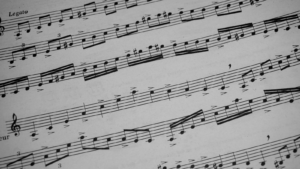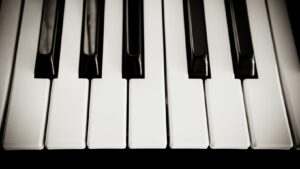Every musician, novice or veteran, encounters a plethora of symbols and terms on their musical journey. One such symbol is ‘8va’, a small yet potent notation that can shift the entire mood of a piece. But what exactly does this mysterious term mean in the realm of music?
‘8va’ is a term that’s often shrouded in confusion, even for seasoned musicians. It’s a notation that can change the pitch, tone, and even the emotional impact of a piece. This article aims to demystify ‘8va’, exploring its origins, its usage, and its profound influence on the musical narrative.
So, whether you’re a budding musician or a curious reader, join us as we delve into the fascinating world of ‘8va’ and its role in shaping the music we know and love.
What Does 8va Mean In Music
‘8va’ in music signals performers to play notes one octave higher than written on the staff. Originating from the Italian term ‘all’ ottava,’ it impacts a piece’s tone by shifting its pitch, thus modifying its emotional narrative. Understanding ‘8va’ benefits any musician, ranging from novices to experts, as its correct implementation can enhance a piece’s overall presentation.
The Practical Application of 8va
 Pivotal in musical compositions, 8va presents an easy way for musicians to play notes one octave higher, contributing to a rich tonal landscape. With 8va, composers transcribe complex, high-pitched melodies in a simplified fashion. For instance, instead of writing notes on leger lines above the staff, they use ‘8va’ above the notes, ensuring legibility and execution. Similarly, transposing instruments like guitars employ 8va for pitch accuracy. As a tactical tool for nuance and emotional intensity, 8va’s underlines its practical application in transforming music aesthetics.
Pivotal in musical compositions, 8va presents an easy way for musicians to play notes one octave higher, contributing to a rich tonal landscape. With 8va, composers transcribe complex, high-pitched melodies in a simplified fashion. For instance, instead of writing notes on leger lines above the staff, they use ‘8va’ above the notes, ensuring legibility and execution. Similarly, transposing instruments like guitars employ 8va for pitch accuracy. As a tactical tool for nuance and emotional intensity, 8va’s underlines its practical application in transforming music aesthetics.
Despite the prominence of 8va in music notation, other symbols also serve to indicate changes in octave. Among these are 8vb, 15ma, and 15mb, each offering unique commands to musicians. By comparing 8va to these alternatives, readers gain a deeper understanding of the flexibility and detail present in musical notation. Utilizing 8va and its counterparts optimizes the audience’s reception of sound, orchestrates the musicians’ understanding of their roles, and enriches the overall performance.
Tips for Musicians Interpreting 8va
Understanding the distinction of when and why to use ‘8va’ propels musical proficiency. Playing notes under the ‘8va’ sign requires adept reading skills, ensuring precision in pitch elevation. Practicing pieces that extensively utilize ‘8va’, positions musicians for mastery. Clarity in interpreting ‘8va’ spells the difference in simplified note-reading and accuracy in delivery.
 Implementing ‘8va’ strategically in musical arrangements optimizes sound quality. Whenever high notes become clustered or complex, incorporating the ‘8va’ sign can enhance readability of musical sheets, steering away from excessive ledger lines. Mastery of interpreting ‘8va’ notation charitably eases their performance and reinforces proper interpretation of melodies.
Implementing ‘8va’ strategically in musical arrangements optimizes sound quality. Whenever high notes become clustered or complex, incorporating the ‘8va’ sign can enhance readability of musical sheets, steering away from excessive ledger lines. Mastery of interpreting ‘8va’ notation charitably eases their performance and reinforces proper interpretation of melodies.
Lastly, exploring both ‘8va’ alongside its counterparts ‘8vb’, ’15ma’, and ’15mb’ broadens the musician’s understanding of octave indicators. Fathoming these notations offers advantages, maximizing one’s repertoire and enriching performance delivery. Remember, music isn’t just about playing the right notes – it also involves executing them with the intended register, made more explicit by octave markings like ‘8va’.
Understanding the Use of 8va
So, there you have it. ‘8va’ isn’t just a symbol, it’s a tool for musicians to navigate the complex world of octaves with ease. It’s about lifting the melody, simplifying note-reading, and enhancing the overall musical presentation. The strategic use of ‘8va’ and its counterparts can significantly improve sound quality and readability, especially when dealing with intricate high notes. It’s clear that understanding these octave indicators can broaden a musician’s repertoire and enrich their performance delivery. Remember, it’s not just about playing the notes, it’s about playing them in the right register. So next time you see ‘8va’ on a sheet of music, you’ll know exactly what to do.


